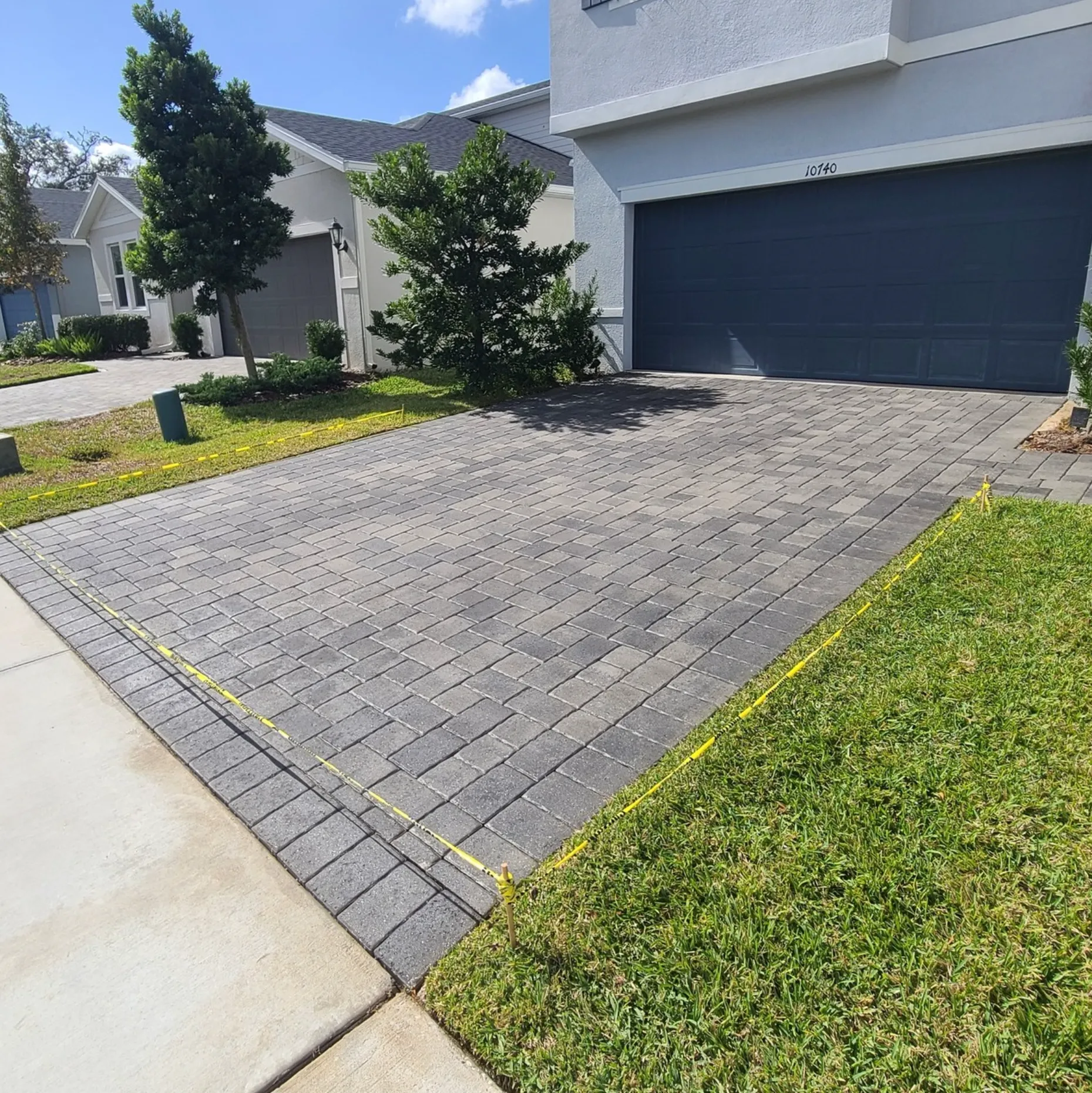Pavers, whether concrete pavers, brick pavers or natural stone pavers, are amazing in any outdoor space. But like all outdoor surfaces, they need regular maintenance to look their best. Over time, pavers can get dirty, and stubborn stains, moss and algae can build up and detract from their look. Whether you like the hands-on approach of DIY cleaning or want to hire paver cleaning services, understanding the cleaning methods and tools like pressure washers and the pros and cons of each will help keep your pavers looking great for years to come.
DIY Paver Cleaning
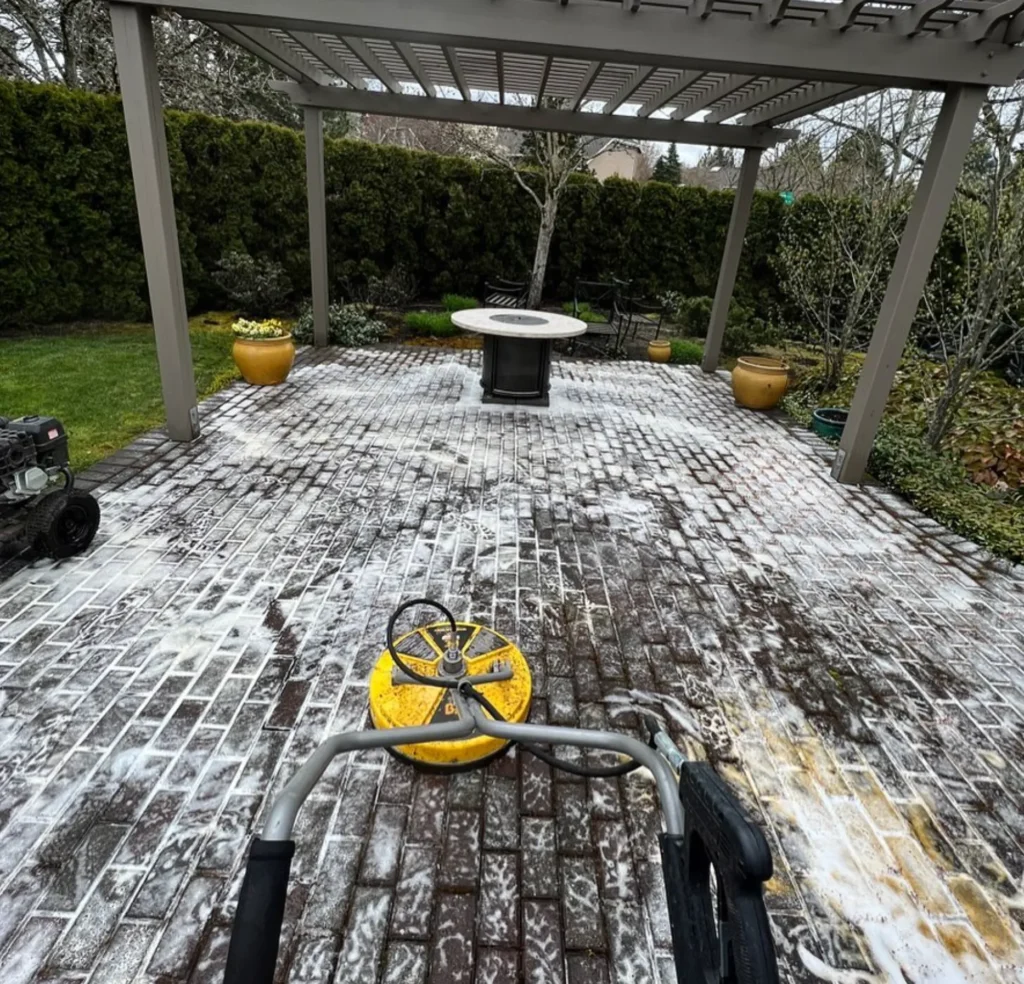
Cleaning your pavers yourself can be a cost effective option. But you need to have the right tools and knowledge to avoid accidental damage or using harsh chemicals that can damage the paver material.
Step 1: Gather the Right Tools
DIY paver cleaning requires some basic but essential tools. Here’s what you’ll need:
- Pressure washer or power washer (if you don’t have one, consider a power washer rental)
- Garden hose with a strong spray attachment
- Warm water
- Stiff-bristle broom, wire brushes or steel brush for scrubbing
- Paver-safe cleaning solution or soapy water
- Joint sand for refilling gaps between pavers
Step 2: Clean Your Pavers
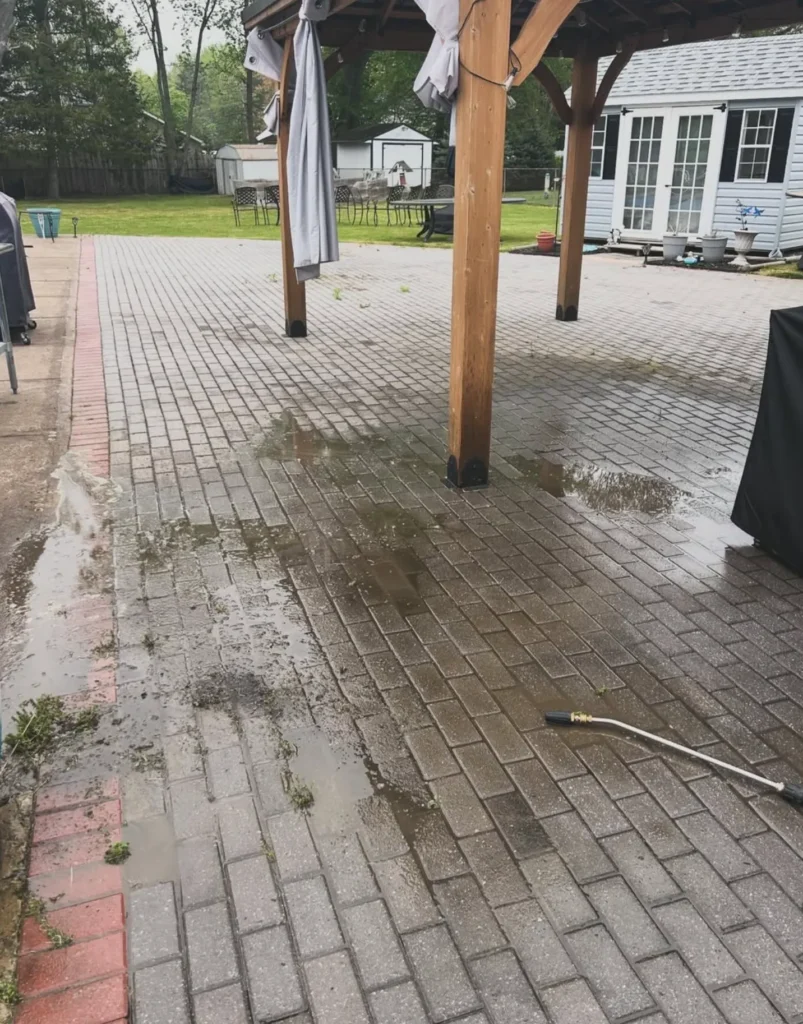
The most important part of any DIY paver cleaning job is to do it thoroughly and methodically:
- Sweep: Use a stiff broom to remove loose debris, leaves and dirt. This prevents the dirt from getting embedded in the pavers when wet.
- Apply warm water and soapy water: Mix warm water with mild dish soap or paver friendly cleaning solution. Apply to the paver surface, focusing on areas with stubborn stains, grease stains or oil stains.
- Scrub with stiff-bristled broom or wire brushes: For tough spots, especially areas with organic stains like moss or Tough Stains like mineral stains, scrub vigorously with a stiff-bristled broom or wire brushes.
- Pressure washing: A pressure washer is one of the most effective tools for cleaning pavers. Use the garden hose or pressure washer to rinse the pavers, remove the loosened dirt, cleaning solution and soap. For delicate surfaces be careful with the pressure to avoid erosion especially on natural stone or delicate pavers.
- Hot water: For better results on Tough Stains, consider using hot water when scrubbing or pressure washing, as it helps break down grease and stubborn stains.
- Refill the joints with sand: Once the pavers are clean and dry, sprinkle joint sand between the paver gaps. This helps to stabilise the pavers and prevent weed growth.
DIY Benefits
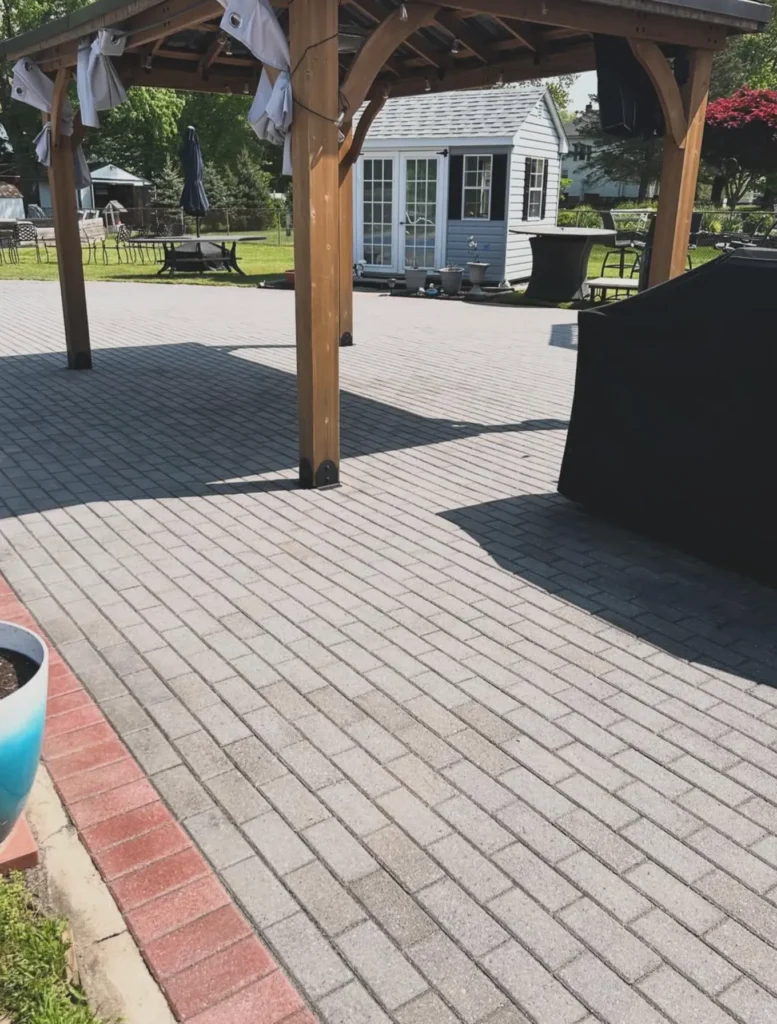
- Cost: You save on labor costs by doing it yourself. Basic tools like a garden hose, stiff broom and pressure washer are enough to get a good clean.
- Control: You can take your time and do it at your own pace, focusing on specific areas with stains on the pavers.
Downsides of DIY Cleaning
- Time-consuming: Cleaning large areas can take hours, especially if you are tackling Neglected paving or block paving with deep stains.
- Damage: Using a pressure washer incorrectly can damage faux stone pavers or delicate pavers. Surface damage is unnecessary.
- Limited results: DIY methods may not remove deep seated mineral stains or rust stains, which require professional grade equipment and expertise.
Professional Paver Cleaning
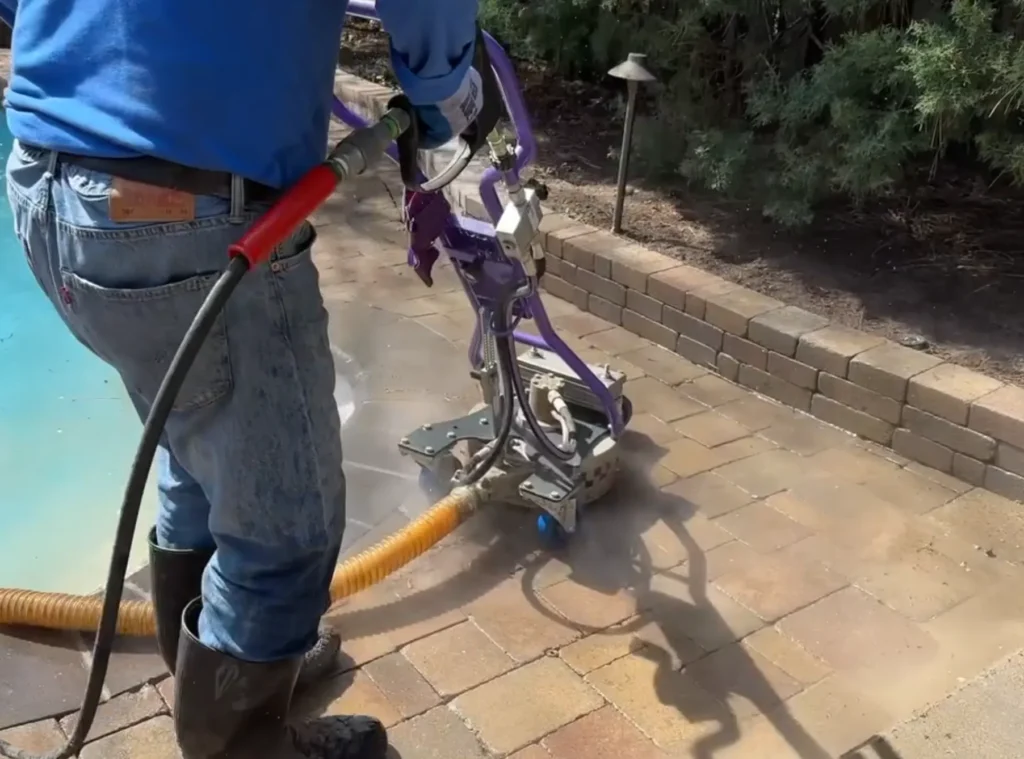
Hiring a professional cleaner or professional paver cleaning services is the way to go if you want to keep your pavers looking their best. Professional cleaners are trained to use the right equipment and techniques to remove the toughest stains and often offer concrete sealing and paver repairs as an added service.
How Professional Paver Cleaners Work
- Pressure washing with high-end equipment: Professionals use high-end pressured water equipment, such as a power washer or pressure washer, to deep clean pavers. They adjust the pressure according to the type of paver (brick pavers, clay pavers, or concrete pavers) to ensure thorough cleaning without damaging the surface. Pressure Cleaning Melbourne services specialize in using advanced techniques to achieve the best results.
- Right cleaning solutions: Professional cleaners use the right cleaning solution for the specific type of stone or paver surface. Whether you have organic matter, algae stains or Dirt stains, they’ll choose the right product for the job, not harsh chemicals that can damage the material.
- Sealing the surface: After cleaning, professionals often apply a sealing process to the pavers. This involves applying a protective barrier to the paver surface to prevent future staining and pavers from water damage. Sealing also reduces weather damage from sun, rain and snow, prolonging the life of your pavers.
- Filling paver joints: Many professional paver cleaner services include filling paver sand between the paver joints. This keeps the pavers stable and prevents weeds from growing.
Benefits of Professional Cleaning
- Deep cleaning: Professionals use advanced cleaning techniques and commercial grade equipment to remove deep seated dirt and Tough Stains.
- No damage: Professionals know how to adjust pressure on pressure washers and use cleaning methods that won’t damage your pavers.
- Added services: Many professional paver cleaning services offer paver repairs, sealing, and even applying protective coatings for long-lasting results.
Downsides of Professional Cleaning
- Cost: Hiring a professional can be more expensive upfront, especially if additional services like concrete sealing are included.
- Time: Depending on the service, you may have to wait for an appointment, and the job may take longer if additional steps like sealing or paver repairs are involved.
DIY or Professional: Which is Best for You?

When deciding between DIY and professional cleaning several things come into play, size of your outdoor space, amount of cleaning required and type of pavers in your area.
- DIY is best for small jobs or pavers with mild dirt and organic stains. With basic tools like a garden hose, pressure washer and stiff brush you can maintain your pavers regularly with no big cost.
- Professional is the way to go for larger areas, block paving maintenance or heavily stained areas where advanced cleaning methods and equipment like high pressure hose or power washer are required. Professionals can also protect your pavers for longer period by applying a sealant.
FAQ
How often should I clean my pavers?
Once a year is ideal but areas with high traffic, exposed to harsh elements or frequent staining from pavers may require more frequent cleaning.
Can I damage my pavers by using a pressure washer?
Yes, if not used properly. A pressure washer can damage delicate pavers, faux stone pavers or erode paving blocks. Always follow the manufacturer’s recommendations for pressure settings.
Do I need to seal it after the paver cleaning?
Sealing is recommended especially for brick pavers or concrete pavers. It creates a protective layer that shields against dirt, algae and water damage stains.
Can I use a garden hose instead of a pressure washer?
A garden hose with a strong spray attachment can be used for light cleaning and rinsing but may not be as effective for deeper stains and grime.
What kind of stains can professional cleaners remove?
Professional cleaners can remove various types of stains, including oil stains, grease stains, organic stains and mineral stains. They use specific cleaning solutions to safely remove these without damaging your pavers.
